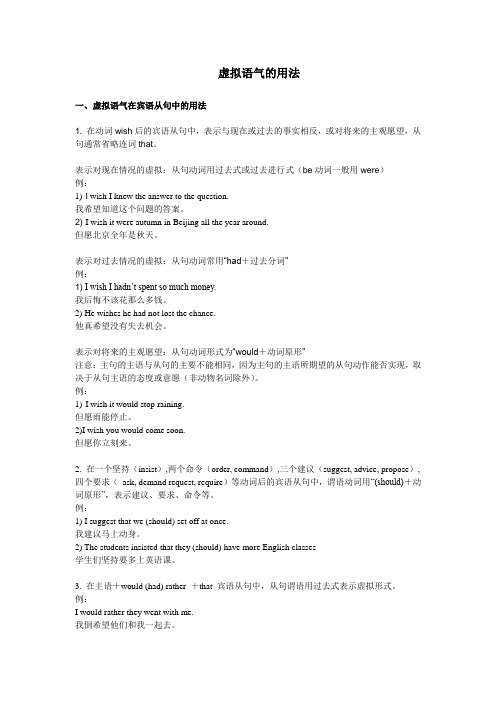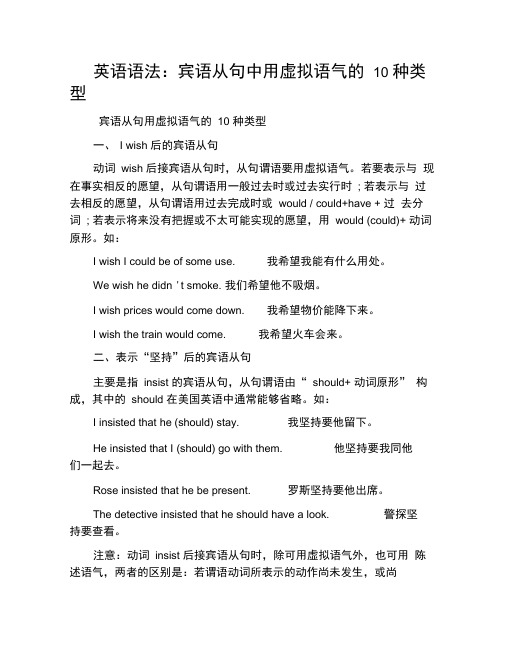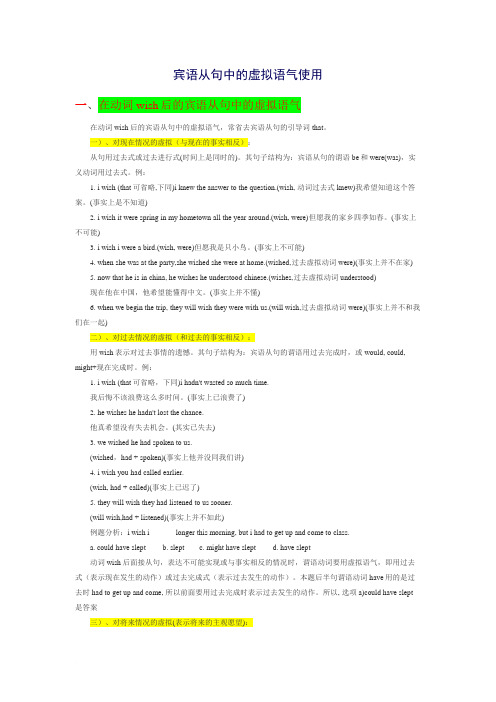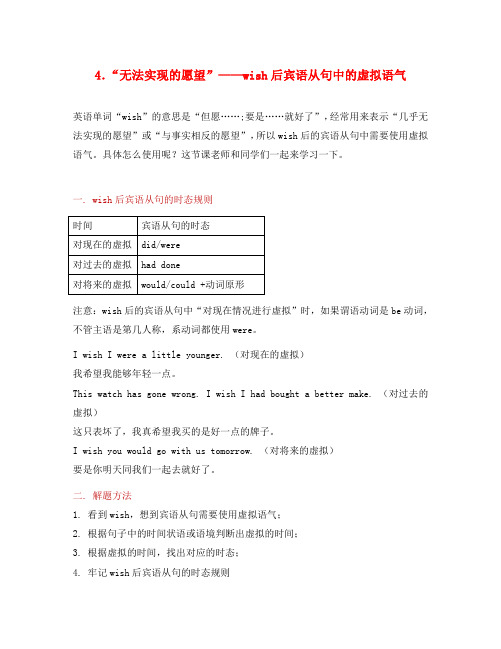动词wish后宾语从句中的虚拟语气
虚拟语气的八种情况

No.1虚拟语气的常见类型和句型(1)由wish引起的表示愿望的虚拟语气A.用wish表示对现在的愿望时,它所引起的宾语从句中谓语动词形式为:过去式(be动词用were)。
B.用wish表示对将来的愿望时,它所引起的宾语从句中谓语动词形式为:would, could, might+ 动词原形。
C.wish用于对过去的事实表示一种不可能实现的愿望时,宾语从句中的谓语动词形式为:had+动词过去分词或could, would + have +动词过去分词。
The picture exhibition bored me to death; I wish I had not gone to it.---“I let Joe borrow our radio for the afternoon.”---“That’s all right, but I wish he would buy one of his own.”I wish that he weren’t so lazy.(2)had hoped引起的宾语从句中备用语动词形式为would+动词原形,表示一种过去未实现的愿望或令人失望的事。
His father had hoped that his son would go to business with him, but his son became an artist later.(3)would (had) rather, would as soon, would sooner和would prefer所引起的从句中要求用过去式表示当时或将来的情况,用过去完成时表示过去的情况,表示希望或婉转的责备。
例如:I’d rather you posted the letter right away. 我倒希望你把这封信立刻寄出去。
I would prefer he didn’t stay there too long.我倒希望他不要在那儿可得太久。
虚拟语气Wish的用法

虚拟语气Wish的用法Wish是希望; 祝愿; 想要;的意思虚拟语气Wish的用法有哪些呢?本文是店铺整理虚拟语气Wish的用法的资料,仅供参考。
虚拟语气Wish的用法1)wish后面的从句,表示与事实相反的情况,或表示将来不太可能实现的愿望。
其宾语从句的动词形式为:主句从句从句动作先于主句动词动作(be的过去式为 were) 现在时过去时从句动作与主句动作同时发生(had + 过去分词) 过去时过去完成时将来不大可能实现的愿望将来时 would/could +动词原形例如:I wish I were as tall as you. 我希望和你一样高。
He wished he hadn't said that. 他希望他没讲过那样的话。
I wish it would rain tomorrow. 我希望明天下雨就好了。
2)wish to do;wish sb / sth to do.例如:I wish to see the manager. = I want to see the manager. 我希望见一见经理。
I wish the manager to be informed at once. (= I want the manager to be informed at once.)我希望经理能马上得到消息。
wish的用法1)用于wish后面的从句,表示与事实相反的情况,或表示将来不太可能实现的愿望。
其宾语从句的动词形式为:真实状况 wish后从句动作先于主句动词动作现在时过去时(be的过去式为 were)从句动作与主句动作同时发生过去时过去完成时(had + 过去分词)将来不大可能实现的愿望将来时 would/could +动词原形I wish I were as tall as you. 我希望和你一样高。
He wished he hadn't said that. 他希望他没讲那样的话。
动词wish后宾语从句中的虚拟语气

虚拟语气与习题1.动词wish后宾语从句中的虚拟语气2.1) 用wish表示现在的祝愿和抱歉。
3.其句子结构为:宾语从句的谓语be用were(was),实义动词用过去式。
例:I wish they were at home this time.4.2) 用wish表示对过去事情的遗憾。
5.其句子结构为:宾语从句的谓语用过去完成时,或could+现在完成时。
例:I wishI hadn' t hurt him so much。
6.3) 用wish表示对将来事情的愿望。
其句子结构为宾语从句的结构,谓语为would/could/might+动词原形。
例:I wish I might be able to come tomorrow。
7. 2. 用在一般虚拟条件句中的虚拟语气8.1) 表示与现在、过去、将来事实相反的假设9.①与此刻事实相反的假设。
10.其句子结构为:11.从句:if+主语+动词的过去式(be变were)+其他12.主句:主语+would(should, could, might)+动词原形+其他13.例:If I were you, I would go with him.14.②与过去事实相反的假设。
15.其句子结构为:16.从句:If+主语+过去完成时+其他17.主句:主语+should(would, could, might)+现在完成时+其他。
18.例:If you had studied harder last term, you could have passed the exam.③表示对未来事实实现的可能性不大的假设。
其句子结构为:从句:If+主语+should (were to )+动词原形+其他主句:主语+would (could, should, might)+动词原形例:If he were to go tomorrow, he might tell you.2.) 从句和主句要根据各自发所生的时间选用符合具体时间的虚拟语气形式①从句表示过去,主句表示此刻。
英语语法:虚拟语气的用法

虚拟语气的用法一、虚拟语气在宾语从句中的用法1. 在动词wish后的宾语从句中,表示与现在或过去的事实相反,或对将来的主观愿望,从句通常省略连词that。
表示对现在情况的虚拟:从句动词用过去式或过去进行式(be动词一般用were)例:1) I wish I knew the answer to the question.我希望知道这个问题的答案。
2) I wish it were autumn in Beijing all the year around.但愿北京全年是秋天。
表示对过去情况的虚拟:从句动词常用“had+过去分词”例:1) I wish I hadn’t spent so much money.我后悔不该花那么多钱。
2) He wishes he had not lost the chance.他真希望没有失去机会。
表示对将来的主观愿望:从句动词形式为“would+动词原形”注意:主句的主语与从句的主要不能相同,因为主句的主语所期望的从句动作能否实现,取决于从句主语的态度或意愿(非动物名词除外)。
例:1)I wish it would stop raining.但愿雨能停止。
2)I wish you would come soon.但愿你立刻来。
2. 在一个坚持(insist),两个命令(order, command),三个建议(suggest, advice, propose),四个要求(ask, demand request, require)等动词后的宾语从句中,谓语动词用“(should)+动词原形”,表示建议、要求、命令等。
例:1) I suggest that we (should) set off at once.我建议马上动身。
2) The students insisted that they (should) have more English classes学生们坚持要多上英语课。
英语语法:宾语从句中用虚拟语气的10种类型

英语语法:宾语从句中用虚拟语气的10 种类型宾语从句用虚拟语气的10 种类型一、I wish 后的宾语从句动词wish 后接宾语从句时,从句谓语要用虚拟语气。
若要表示与现在事实相反的愿望,从句谓语用一般过去时或过去实行时; 若表示与过去相反的愿望,从句谓语用过去完成时或would / could+have + 过去分词; 若表示将来没有把握或不太可能实现的愿望,用would (could)+ 动词原形。
如:I wish I could be of some use. 我希望我能有什么用处。
We wish he didn 't smoke. 我们希望他不吸烟。
I wish prices would come down. 我希望物价能降下来。
I wish the train would come. 我希望火车会来。
二、表示“坚持”后的宾语从句主要是指insist 的宾语从句,从句谓语由“ should+ 动词原形” 构成,其中的should 在美国英语中通常能够省略。
如:I insisted that he (should) stay. 我坚持要他留下。
He insisted that I (should) go with them. 他坚持要我同他们一起去。
Rose insisted that he be present. 罗斯坚持要他出席。
The detective insisted that he should have a look. 警探坚持要查看。
注意:动词insist 后接宾语从句时,除可用虚拟语气外,也可用陈述语气,两者的区别是:若谓语动词所表示的动作尚未发生,或尚未成为事实,则用虚拟语气; 若谓语动词所表示的动作已经发生,或已经成为事实,则要用陈述语气。
比较:He insisted that I had read his letter. 他坚持说我看过他的信。
He insisted that I should read his letter. 他坚持要我看他的信。
wish虚拟语气

wish虚拟语⽓wish虚拟语⽓“wish+宾语从句”表⽰不能实现的愿望,汉语可译为“可惜……”、“……就好了”、“悔不该……”、“但愿……”等。
表⽰现在不能实现的愿望,从句的谓语动词⽤过去式;表⽰将来不能实现的愿望,⽤"would(could)+动词原形";表⽰过去不能实现的愿望,⽤"had+过去分词"或"(could)would+have+过去分词"。
例如:1). 与现在事实相反:动词过去式或wereI wish we could go to the seaside today.I wish I were as tall as you.我希望和你⼀样⾼。
I wish I were a pop singer. (=I am sorry I am not a pop singer..)I wish I were a pilot.但愿我是个飞⾏员。
I wish I knew how to operate the machine.我要是会操作这架机器该有多好啊! (= I'm sorry I don't know.)2).与过去事实相反:主语+wish(that)+主语+ 动词过去完成式We wish we had arrived there two hours earlier.He wished he hadn't said that. 他希望他没讲过那样的话。
I wish I had never stopped teaching. (=I am sorry I stopped teaching.)I wish he hadn't gone.他要是没⾛该多好!(= I'm sorry he has gone.)We wish you had come to our New Year's party.我们真希望你来参加我们的新年联欢会。
宾语从句中的虚拟语气使用

宾语从句中的虚拟语气使用一、在动词wish后的宾语从句中的虚拟语气在动词wish后的宾语从句中的虚拟语气,常省去宾语从句的引导词that。
一)、对现在情况的虚拟(与现在的事实相反):从句用过去式或过去进行式(时间上是同时的)。
其句子结构为:宾语从句的谓语be和were(was),实义动词用过去式。
例:1. i wish (that可省略,下同)i knew the answer to the question.(wish, 动词过去式knew)我希望知道这个答案。
(事实上是不知道)2. i wish it were spring in my hometown all the year around.(wish, were)但愿我的家乡四季如春。
(事实上不可能)3. i wish i were a bird.(wish, were)但愿我是只小鸟。
(事实上不可能)4. when she was at the party,she wished she were at home.(wished,过去虚拟动词were)(事实上并不在家)5. now that he is in china, he wishes he understood chinese.(wishes,过去虚拟动词understood)现在他在中国,他希望能懂得中文。
(事实上并不懂)6. when we begin the trip, they will wish they were with us.(will wish,过去虚拟动词were)(事实上并不和我们在一起)二)、对过去情况的虚拟(和过去的事实相反):用wish表示对过去事情的遗憾。
其句子结构为:宾语从句的谓语用过去完成时,或would, could, might+现在完成时。
例:1. i wish (that可省略,下同)i hadn't wasted so much time.我后悔不该浪费这么多时间。
高中英语 破题致胜微方法(虚拟语气2)4无法实现的愿望-wish后宾语从句中的虚拟语气

4.“无法实现的愿望”——wish后宾语从句中的虚拟语气英语单词“wish”的意思是“但愿……;要是……就好了”,经常用来表示“几乎无法实现的愿望”或“与事实相反的愿望”,所以wish后的宾语从句中需要使用虚拟语气。
具体怎么使用呢?这节课老师和同学们一起来学习一下。
一. wish后宾语从句的时态规则注意:wish后的宾语从句中“对现在情况进行虚拟”时,如果谓语动词是be动词,不管主语是第几人称,系动词都使用were。
I wish I were a little younger. (对现在的虚拟)我希望我能够年轻一点。
This watch has gone wrong. I wish I had bought a better make. (对过去的虚拟)这只表坏了,我真希望我买的是好一点的牌子。
I wish you would go with us tomorrow. (对将来的虚拟)要是你明天同我们一起去就好了。
二. 解题方法1. 看到wish,想到宾语从句需要使用虚拟语气;2. 根据句子中的时间状语或语境判断出虚拟的时间;3. 根据虚拟的时间,找出对应的时态;4. 牢记wish后宾语从句的时态规则三. 经典例题1. The picture exhibition bored me to death. I wish I__________to it.A. had not goneB. have not goneC. did not goD. can not have gone解析:本题考查wish后宾语从句的虚拟语气。
句意:这次的图片展真把我烦死了。
我真希望我没有去看。
由句意可知“我希望自己没有去看图片展”是与事实相反的,所以这里需要使用虚拟语气。
由前一句中动词“bored”的形式可知是对过去事实的虚拟,所以wish后的宾语从句中应该使用过去完成时had not gone。
答案:A2. How I wish every family__________a large house with a beautiful garden.A. hasB. hadC.will haveD.had had解析:本题考查wish后宾语从句的虚拟语气。
- 1、下载文档前请自行甄别文档内容的完整性,平台不提供额外的编辑、内容补充、找答案等附加服务。
- 2、"仅部分预览"的文档,不可在线预览部分如存在完整性等问题,可反馈申请退款(可完整预览的文档不适用该条件!)。
- 3、如文档侵犯您的权益,请联系客服反馈,我们会尽快为您处理(人工客服工作时间:9:00-18:30)。
主语+would(should, could, might)+动词原形+其他
例:
If I were you, I would go with him.
②与过去事实相反的假设。
其句子结构为:
从句:
If+主语+过去完成时+其他
主句:
主语+should(would, could, might)+现在完成时+其他。
A. Had it not been
B. Were it not
C. Be it not
D. Should it not be
[答案]
A. Had it not been
[注释]本题测试交错时间的虚拟语气。从句是表示过去时间的虚拟条件,if省略,主语it与助动词had倒装。虚拟条件句也可写成这样:
Ifithadnorbeenforthetimelyinvestmentfromthegeneral public。这是重点句型,在各类测试中常考。
4.在表示建议、命令、要求、忠告等动词的后面,其宾语从句的谓语用“should+动词原形”表示虚拟语气
常用的此类动词有:
表示“要求”的:
ask, desire, request, demand, require, beg
表示“提议、劝告、建议”的:
decide, order
表示“主张”的:
maintain, urge
3)用“would rather/had rather' wouldjust as soon"表示“宁愿、但愿”,后面的宾语从句谓语用过去式或动词原形表示对将来的要求,用过去时表示对现在的愿望,用过去完成时表示对过去做的事的懊悔。
Don' t live in the world, I would rather( I would just as soon) you die.I would rather you go tomorrow.
5.在“It is (was)+形容词(或过去分词)+that„„”结构中,主语从句的谓语也用“should+原形动词“表虚拟语气
美国英语中省去should,常用的形容词和过去分词有:
表示“要求”的:
required, demanded, requested, desired。
表示“建议”的:
表示“迫切、紧近、重要”的:
He took a map with him lest he (should ) lose his wag there.
2) “whether不管、无论”引导的让步状语从句,有时用动词原形。
All things, whether you know or don' t know, exist in the world.
例:
It was necessary that we (should) make everything ready ahead of time.It is required that nobody (should)smoke here.
6.由下列名词或短语引导,或含有某些词的从句中应用的虚拟语气
1) “Iest以免、惟恐”引导的从句用“should+动词原形”。
IwishIhadn'thurthim so much。
3)用wish表示对将来事情的愿望。其句子结构为宾语从句的结构,谓语为would/could/might+动词原形。例:
2.用在一般虚拟条件句中的虚拟语气
1)表示与现在、过去、将来事实相反的假设
①与现在事实相反的假设。
其句子结构为:
从句:
if+主语+动词的过去式(be变were)+其他
例1:Christiestaredangrilyatherbossandturnedaway,asthough__outoftheoffice.
A. went
B. gone
C. to go
D. would go
[答案]
C. to go
[注释] as though或as if引导的状语从句中,从句主语和主句主语相同时,从句中可省略主语和部分谓语,如:1) She paused, as if to let the painful memories pass. (省略she wanted)2)From time totimeJasonturnedround as though searching for someone. (省略he were)3)Theboystarted,asifawakenedfromsomedream.(省略hewere)由此可见,本题中省略shewanted。
Theoldmanlookedatthepicture,hefeltasthoughhehadgonebacktotime20yearsago.(用过去完成式表示与过去相反的事实)
They talked and talked as if they would never meet again (would+动词原形,表示与将来事实相反)
例:
If you had studied harder last term, you could have passed the exam.③表示对将来事实实现的可能性不大的假设。
其句子结构为:
从句:
If+主语+should (were to )+动词原形+其他
主句:
主语+would (could, should, might)+动词原形
虚拟语气与习题
1.动词wish后宾语从句中的虚拟语气
1)用wish表示现在的祝愿和抱歉。
其句子结构为:
宾语从句的谓语be用were(was),实义动词用过去式。例:
Iwishtheywereathome this time.
2)用wish表示对过去事情的遗憾。
其句子结3;现在完成时。例:
6)用“without/butfor/intheabsenceof”表示“要不是”,“如果没有”(相当于ifitwerenot for„)表示条件时,句中一般用虚拟语气。(也可用陈述语气)
Without your help, I couldn' t finish my work on time.
In the absence of water and air, nothing could live
3.可以引起与事实相反的方式状语从句,用虚拟语气;由asif、asthough引起的与事实相反的句子,不论主句的谓语是现在时或者说过去时,其谓语表示的时间概念和句子结构,都基本上与wish后的宾语从句相同。例:
Johnpretendsasifhedidn'tknowthethingatall,butinfactheknowsitverywell.(用过去式表示与现在事实相反的假设)
[译文]要不是老百姓的及时投资,我们的公司不会像现在这样兴旺。
例4: The millions of calculations involved, had they been done by hand, all practicalvalue__ by the time they were finished.
③从句表示过去,主句表示将来。
Ifwehadn'tmadequatepreparations,weshouldn'tdaretodotheexperimentnextweek。
④从句表示将来,主句表示现在。
If we shouldn’t have an exam this afternoon, I would go shopping now.
7)由“providing (that)/ provided (that)/on condition that/ in order that”引导的条件从句或目的从句,根据情况,可用虚拟语气。(有时也可用陈述语气)
They are willing surrender provided they are given free passage.
[译文]克里斯蒂愤怒地盯了老板一眼并转过身去,似乎想走出办公室。
例2:I'dratheryou__bytrain,becauseIcan'tbeartheideaofyourbeinginairplanein such bad weather.
A. would go
B. should go
C. went
表示“同意、坚持”的:
consent, insist
例:
The doctor suggested that he (should) try to lose his weight.
He insisted that we (should) tell him the news.
The advice is that we (should) leave at once.
I would rather everything hadn' t happened in the past.
4)用“had hoped”表示原来希望做到而实际上未能实现的事情,其宾语从句的谓语用“would+动词原形”。
I had hoped that she would go to the U.S. and study there, but she said she liked to stayin China.
5)在“Itis(high/about)time+that”引导的定语从句中,定语从句的主谓语用一般过去时,偶尔也可以用would(或should)+动词原形,或had rather (would rather)+动词原形。It is high (about)time that we left/should leave/ had better leave/had rather leave/ wereleaving.(注意与“This is the first/second„time”后从句中用现在完成时的区别。
